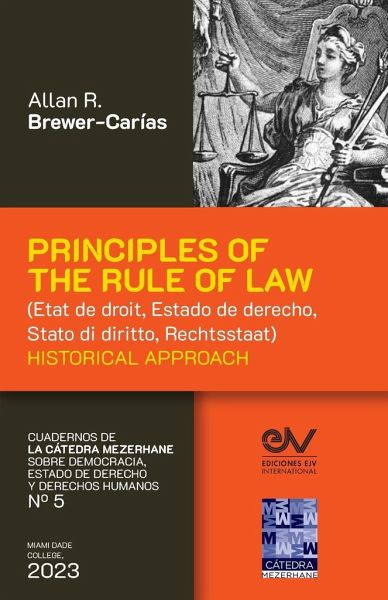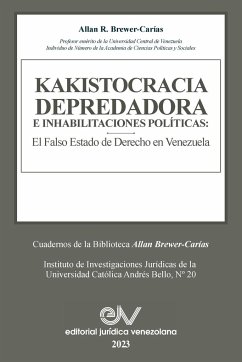
PRINCIPLES OF THE RULE OF LAW (État de droit, Estado de derecho, Stato di diritto, Rechtsstaat). Historical Approach
Versandkostenfrei!
Versandfertig in 1-2 Wochen
24,99 €
inkl. MwSt.

PAYBACK Punkte
12 °P sammeln!
This book of Professor Allan R. Brewer-Carías, deals with the concept of the Rule of Law State, which is equivalent to the German Rechtsstaat, the French État de droit, the Spanish Estado de derecho and the Italian Stato di diritto, which had its origin in the basic ideas and principles generated after the English Glorious Revolution of the seventeenth century, from the American and the French Revolutions of the eighteenth century, when the Modern Constitutional State began to be conceived in substitution of the Absolut State. This provoked a radical change in the organization and functionin...
This book of Professor Allan R. Brewer-Carías, deals with the concept of the Rule of Law State, which is equivalent to the German Rechtsstaat, the French État de droit, the Spanish Estado de derecho and the Italian Stato di diritto, which had its origin in the basic ideas and principles generated after the English Glorious Revolution of the seventeenth century, from the American and the French Revolutions of the eighteenth century, when the Modern Constitutional State began to be conceived in substitution of the Absolut State. This provoked a radical change in the organization and functioning of the State, based on the principle that not only must all the powers of the public bodies forming the State stem from the law, or be established by law, but also that those powers are limited by law. In fact, Rule of Law is a comprehensive concept that, when referred to the contemporary Modern Constitutional State as a State subject to the law, logically implies much more than the "principle of legality" or the "prevalence of the law," referring concurrently to the State in which there exists: first, a Constitution, as a supreme norm, to which the State organs are subject as well as to the principle of legality, generally; second, a system of representative democratic government elect-ed by the people, as sovereign; third, a system of limitation of the State's power by means of the distribution, separation or division thereof, whereby the public power is controlled as a guarantee of public freedoms; forth, the principle of legality, or the submission of all organs of the state to the law; fifth, the declaration of fundamental rights and freedoms of citizens embodied in the Constitution that all organs of the State must enforce and guarantee; and sixth, a system of judicial or jurisdictional control of the constitutionality and legality of the State's acts exercised by autonomous and independent courts. Therefore, the purpose of the author in this essay is to remember and analyze the historical background of the concept and, in particular, of each of its elements, starting with the Revolution that took place in the former Colonies of North America in 1776, and the France Revolution of 1789, where for the first time in Modern history, a process of building a new conception of the State under a new Constitution was developed.














